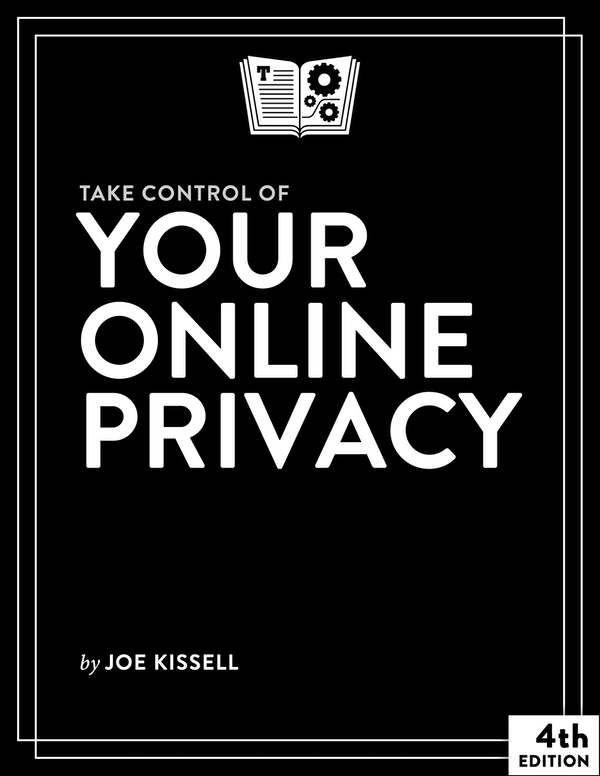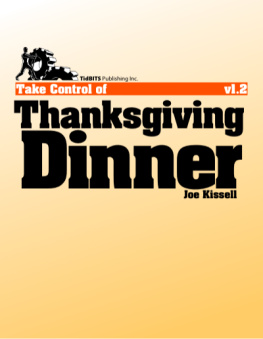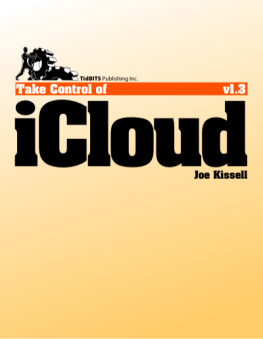Kissell - Take Control of Your Online Privacy
Here you can read online Kissell - Take Control of Your Online Privacy full text of the book (entire story) in english for free. Download pdf and epub, get meaning, cover and reviews about this ebook. year: 2019, publisher: Take Control Books, genre: Politics. Description of the work, (preface) as well as reviews are available. Best literature library LitArk.com created for fans of good reading and offers a wide selection of genres:
Romance novel
Science fiction
Adventure
Detective
Science
History
Home and family
Prose
Art
Politics
Computer
Non-fiction
Religion
Business
Children
Humor
Choose a favorite category and find really read worthwhile books. Enjoy immersion in the world of imagination, feel the emotions of the characters or learn something new for yourself, make an fascinating discovery.

Take Control of Your Online Privacy: summary, description and annotation
We offer to read an annotation, description, summary or preface (depends on what the author of the book "Take Control of Your Online Privacy" wrote himself). If you haven't found the necessary information about the book — write in the comments, we will try to find it.
Take Control of Your Online Privacy — read online for free the complete book (whole text) full work
Below is the text of the book, divided by pages. System saving the place of the last page read, allows you to conveniently read the book "Take Control of Your Online Privacy" online for free, without having to search again every time where you left off. Put a bookmark, and you can go to the page where you finished reading at any time.
Font size:
Interval:
Bookmark:

Joe Kissell
Welcome to Take Control of Your Online Privacy, Fourth Edition, version 4.0, published in April 2019 by alt concepts inc. This book was written by Joe Kissell and edited by Geoff Duncan.
This book explains potential privacy risks in everyday online activities like web browsing and sending email, and suggests strategies for avoiding common pitfalls and improving online privacy.
If you want to share this ebook with a friend, we ask that you do so as you would with a physical book: lend it for a quick look, but ask your friend to buy a copy for careful reading or reference. Discounted classroom and user group copies are available.
Copyright 2019, alt concepts inc. All rights reserved.
You can access extras related to this book on the web (use the link in , near the end; its available only to purchasers). On the ebooks Take Control Extras page, you can:
Download any available new version of the ebook for free, or buy any subsequent edition at a discount.
Download various formats, including PDF, EPUB, and Mobipocket. (Learn about reading on mobile devices on our Device Advice page.)
Read the ebooks blog. You may find new tips or information, links to author interviews, and update plans for the ebook.
If you bought this ebook from the Take Control website, it has been added to your account, where you can download it in other formats and access any future updates. However, if you bought this ebook elsewhere, you can add it to your account manually; see .
In the two years since the third edition of this book was released, it seems as though weve all been hearing about new privacy-related issues on an almost daily basis. Technology, legislation, and public opinion surrounding digital privacy are all undergoing rapid changes. As a result, this book required extensive modifications to bring it up to date. Among the most significant changes are the following:
In the chapter
Added a new chapter, , to provide the current lay of the land and point out areas that deserve more attention than they did previously
Prefaced the topic with a new rule: be suspicious
Updated with better and more current links
Mentioned in a few places, including , that usage of SSL on websites is rapidly on the risea very good thing
Completely overhauled the topic to cover the latest options in DNS providers and offer more detail on how to set them up
Revised my advice in to reflect what experts are currently suggesting for macOS and Windows users
Greatly expanded the discussion to explain why conventional wisdom about those two potential threats is not necessarily accurate
Added the topic to explore some of the best privacy-focused browser options
Included numerous mentions of Apples privacy-related changes to Safari in
Added Apple Pay and Google Pay to the list of ways to avoid letting credit card details get into the wrong hands in
Updated the Improve Email Privacy chapter in two important ways: a new sidebar called
Revised to remove mentions of defunct products and services, and add new ones
In the ; also gave additional privacy tips for Facebook
Added Firefox Send to the list of options available to
Updated the topic to talk about even more devices within the Internet of Things that could jeopardize your privacy
Added numerous notes throughout the book pointing to recent news stories about privacy issues of various sorts
A book about online privacy? Thatll be pretty short! my friend joked. It was his way of saying, We both know theres no such thing as privacy on the internet.
Hes not far from the truth, but to be fair, the illusion of privacy extends far beyond the world of computers and networks.
If you want complete privacy, go live in a remote cave without any electronics. Dont build a fire, because the smoke could give away your location. Never step outside, because a satellite or a passing drone might snap your picture. And avoid all human contact, because you never know who might be a spy. I hope you packed plenty of food, water, and clothing, tooyou wont be getting any more!
In other words, theres essentially no such thing as total privacy, online or otherwise. People have to interact with each other to survive, and every interaction reveals something about each participant.
I dont know about you, but I wouldnt want it any other way. I like having family and friends who know me well, and who can get in touch with me whenever they want (or need) to. I like sharing thoughts and opinions with a wider audience online. And I like the convenience of using my computer, phone, or tablet to communicate, find directions, and make purchases anywhere in the world. All these things involve revealing information about myself, so I wouldnt want complete privacy.
And yet, the internet turns many of our everyday assumptions about privacy upside down. If Im at home, I can close the curtains and feel reasonably confident that whatever I say or do inside my house wont be seen or heard by anyone else unless I (or a family member) choose to reveal it. Not so with electronic communications. Whether Im sending email, browsing the web, or doing a video chat with a friend, the only safe assumption I can make is that strangers might be able to see that informationnow or in the future.
Once something has traveled over the internet in any way, its potentially out there foreverand potentially public. I like to say, What happens on the internet, stays on the internet. You can delete a file from your computer, but once data has gone into the cloud, theres never a guarantee that all copies of it have been eternally expunged. In fact, its far more likely that any given piece of data on the internet will live on indefinitely. Not only that, but data tends to escape even strong restraintshence the saying information wants to be free.
To be brutally honest, someone who wants badly enough to learn what youve transmitted or received on the internet can probably do so, given enough time, effort, and skill. Part of the reason for this book is to explain how your words, personal information, and activities could become known to individual strangers or even the publicand that knowledge may lead you to make different choices about how you use the internet. But Im not saying you must give up any hope of basic privacy. On the contrary, common-sense strategiesthe internet equivalent of drawing the curtains and locking your doorcan significantly reduce the risk of having your personal information fall into unwelcome hands. And, when you have more sensitive or valuable data to protect, you can take appropriately stronger measures.
Of course, there are often trade-offsyou may lose convenience, valuable social interaction, and even (paradoxically) personal safety if you choose to keep certain information private. For example, the same technology that can reveal your whereabouts to advertisers could also help someone trying to rescue you during a natural disaster or other emergency. Privacy cuts both ways. Thats why I dont recommend attempting to lock down all electronic communication, all the time. You need the curtains open to see the sunlight, and you need the open internet too.
Font size:
Interval:
Bookmark:
Similar books «Take Control of Your Online Privacy»
Look at similar books to Take Control of Your Online Privacy. We have selected literature similar in name and meaning in the hope of providing readers with more options to find new, interesting, not yet read works.
Discussion, reviews of the book Take Control of Your Online Privacy and just readers' own opinions. Leave your comments, write what you think about the work, its meaning or the main characters. Specify what exactly you liked and what you didn't like, and why you think so.




